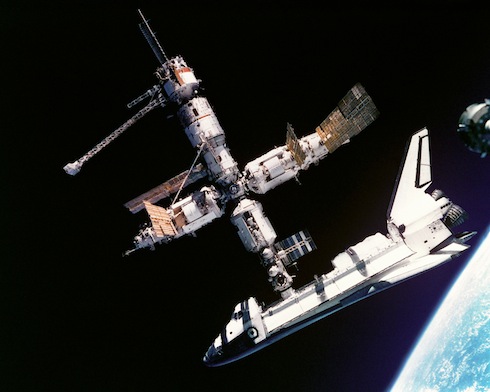This morning, adhering to its scheduled launch time almost exactly, the space shuttle Atlantis rocketed into orbit for the last time. This is not only the final flight for Atlantis but also the final flight of the space shuttle program, as we know it. Since 1981, the Space Shuttle fleet has served as America’s primary method of exploring space on a tactile, personal level. A lot of speculation has been written about what will take its place. From the ill-fated Constellation Program, to numerous talks of unmanned craft, the future of the America’s space vehicle options are unclear. After all, there’s an International Space Station up there and we can’t very well walk there!
And while many discuss the politics and economics surrounding this definitive end of an era, I’d like to briefly share what 30 years of the Space Shuttle has meant to me, and maybe what it has meant to you too.
In 1981, the Space Shuttle Columbia was launched for the first time. I was also born in 1981, so my memories of that first launch are a little hazy. However as a kid, I subscribed to a now-defunct magazine called Final Frontier, which was essentially a youth version of Omni. (Think Highlights or Ranger Rick only with space facts.) In the days before blogs, this magazine was an invaluable resource. It told me when Voyager 2 was going to reach Neptune, various proposals for a Mars mission, and retrospectives on the Apollo and Vostock programs. Most importantly though, were the up-to-date profiles of every single shuttle mission including the crewmembers, the payload, the purpose of the mission and all the scheduled launch times. This section even told you when and where one could potentially see the Shuttle in the night sky either with a telescope or the naked eye.
On one particular Endeavour mission, my father and I got up on the roof of our Arizona home to see if we could spot the little speck ambling across the stars. My father is a photographer, so instead of a proper telescope, we peered through one of his particularly long camera lenses. Better than nothing. Also, my father planted in my head the bizarre idea that we should send the crew of Endeavour some kind of message. At that time, I knew morse code, which like my ability to read Latin, is something that has faded away in my thirty years on planet Earth. Anyway, Dad suggested we send the mission number of Endeavour to them via morse code. Our delivery method of this message? One of my Dad’s camera flashes.
I couldn’t have been much older than eleven or twelve, so I should have probably known that there was no way the light from our little flash could possible reach the astronauts on the shuttle. And even if through some miracle, our light message was transported up to them, they would have to be looking out the window directly at our home to see it. But, I memorized how to represent STS and then whatever the number of the mission was in morse code all the same. At some point, just as Final Frontier and the radio had promised, a little speck appeared through Dad’s camera lens and I stood up, and flashed away.
The point isn’t whether the astronauts saw it. The point is that I wanted to be a part of it. Like a lot of kids, I had brief flirtation with the idea of being an astronaut, but the space program, and the shuttle in particular had a different effect on me. Like so many of us, the space shuttle cheered me up about life. Here was this practical, reasonable space truck, which people used to go up and down from the Earth the same way my family drove to pick up groceries. It was something real and tangible and it always felt like a step towards the future I loved so much in the books I read and the TV shows I liked. It reminded me that human beings were capable of really amazing things. If the space shuttle could continue on even after something as devastating as Challenger, what was I complaining about? Hormones? The onset of total and complete awkwardness? There were bigger fish to fry! If Sally Ride could do something great with her life, why not me?
I think space travel is like that for a lot of us, and the reason why I’m personally saddened by the end of the Space Shuttle program is because it’s been a rock of inspiration for my entire life. The whole time I’ve been around, the shuttle has been doing its thing. I know something will replace it, or at least I have to tell myself that. Because as a kid, it seemed to that I would definitely someday fly in space. And I still want to. More than ever.
Ryan Britt is a staff writer for Tor.com.










